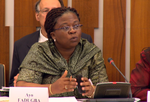Ayodeji FADUGBA
contribution 13 -
FADUGBA Ayodedji

original version
Actually, I was going to talk about the issue of exculpatory evidence which Ms. Conde raised. It is only to say that even after the judgement in the OTP, there are findings on the record. We still have a team that will go through the judgement and look at what we have in our databases to see if there are exculpatory elements that do not go with what was found in the judgement so that we could make disclosure to the Defence.
I think the jurisprudence has expanded to the point where we can safely say that as we look for inculpatory information, we are also looking for exculpatory information. I wanted to add that.
Following Mr. Duval’s intervention and the issue of secrecy for witnesses, I think it is a dilemma because everything happened in a social context. The witnesses go back to the hills. It is easy for the Prosecutor, the Defence or anyone to go to the hills, take witnesses, bring them to Arusha to testify. But the point is, the witnesses go back to live in a social context. Do they want everybody to know that they have testified?
I think the problem is such a human problem that it’s problematic for everyone. It’s a problem I tick for everyone in the sense that it is not a black and white issue. These people are testifying against their neighbours, against their ex doctors, against their friends. It is so a very, very delicate issue, and some of them would like that protection maintained.
Do we have a right to say that they do not have the fear or that they do not have the right to fear or to want to be protected? It is problematic for everyone. While I agree that in the ideal world everybody should know who is testifying, I think there has been a middle of the road solution found in the sense that most of the proceedings are open. The only parts where they become closed are the parts where you speak about the intimate details of the witness. That’s a middle ground.
Thank you.
J.M. SOREL
La seule certitude qui émerge c’est qu’il s’avère assez compliqué effectivement dans la situation qui est celle du Rwanda d’obtenir des témoignages et une protection de témoins suffisante.
Je vais laisser donc laisser la parole, successivement et pour de brèves interventions je précise, tout d’abord à André Michel Essoungou et, ensuite, à François Roux et, enfin, à Roland Amoussouga.

